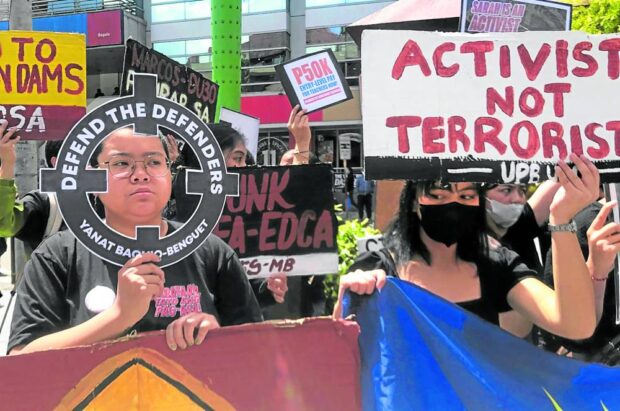Continued use of anti-terror law vs activists worries rights group

NO TO RED-TAGGING Baguio City activists, like their counterparts in Southern Luzon, have been at the receiving end of Red-tagging and charges tied to the antiterror law. In this photo taken on July 24, the activists protest being tagged as terrorists in a rally staged to coincide with President Marcos’ State of the Nation Address. —VINCENT CABREZA
LUCENA CITY—A human rights lawyer slammed anew the controversial Republic Act No. 11479, or the Anti-Terrorism Act (ATA) of 2020, as it has become the military’s “repressive” tool and weapon against activists and legitimate dissenters.
“It (ATA) was highly susceptible to abuse of power, and indeed, that has happened,” lawyer Maria Sol Taule said at an online press conference organized by Depend Southern Tagalog (Defend ST) on Monday.
Southern Tagalog is the old name of the Calabarzon region, which comprises the provinces of Cavite, Laguna, Batangas, Rizal and Quezon.
Taule recalled how they vehemently opposed the legislated measure even before it was approved by former President Rodrigo Duterte on July 3, 2020.
False accusations
She noted that at least 37 petitions were brought before the Supreme Court to declare the law unconstitutional. But in December 2021, it declared RA 11479 constitutional except for two of its provisions, one of which equated protests with terrorism and another that designated individuals or groups as terrorists upon the request of local or foreign groups.
Article continues after this advertisementTaule said that RA 11479 has now become a convenient tool for the state security forces to file trumped-up criminal charges against activists and human rights defenders by persecuting and linking them to the communist New People’s Army (NPA).
Article continues after this advertisementDuring the press conference, human rights workers Jasmin Rubia, Hailey Pecayo, Kenneth Rementilla and Protestant Pastor Edwin Egar narrated their ordeal after the military filed numerous criminal cases against them for alleged violations of RA 11479.
On Dec. 7, 2022, Rementilla and Rubia were charged before the Batangas Prosecutor’s Office by Sgt. Jean Claude Bajaro of the 59th Infantry Battalion (IB) for allegedly providing “material support” to NPA members in Taysan town on July 22 that year.
The two denied the accusation and argued that they were in the area as members of a fact-finding mission investigating the alleged extrajudicial killings of two civilians. Rementilla said he was anxious about the possible outcome of the case against them: “We feel fear and anxiety because the ATA, which is being used against us, the human rights defenders, is nonbailable, and the punishment ranges from lifetime imprisonment to death.”
Pecayo, who also faces similar charges filed by the military, also denied her alleged link with the insurgents.
The Inquirer asked the 59th IB for comment on the issue but the military unit did not reply.
Charm Maranan, Defend ST spokesperson, claimed a “de facto martial law” is now happening in the country amid the military’s relentless attacks on human rights defenders, activists and progressives.
Taule said the lawsuits against human rights defenders were “intended to censor, intimidate and silence critics by burdening them with the cost of legal defense until they abandoned their criticism or opposition.” INQ